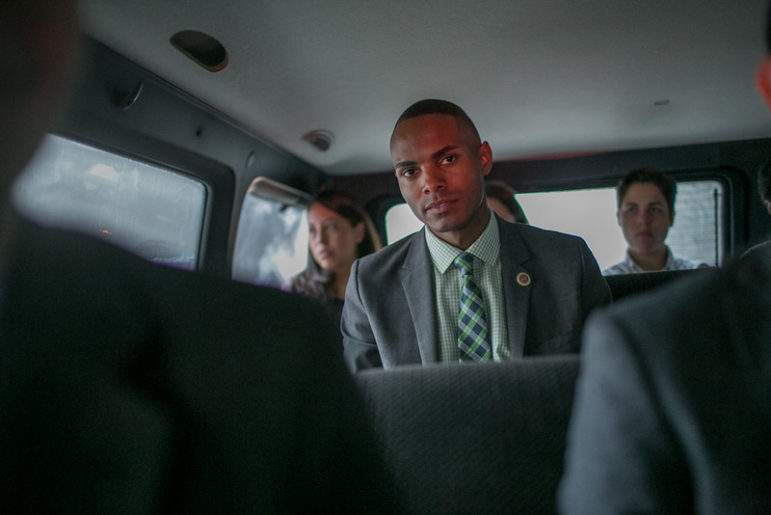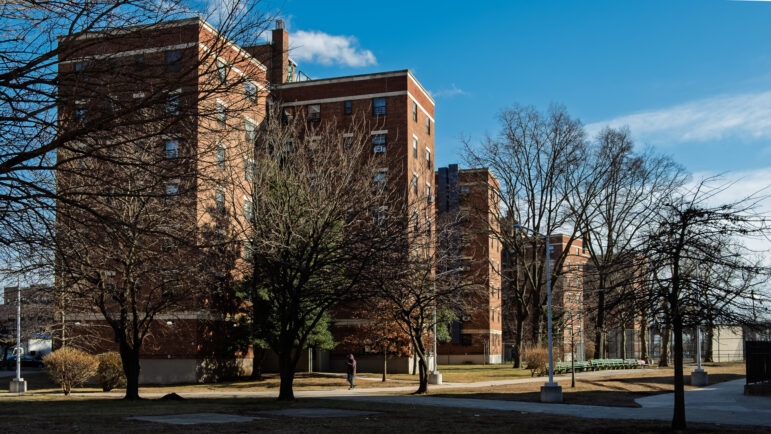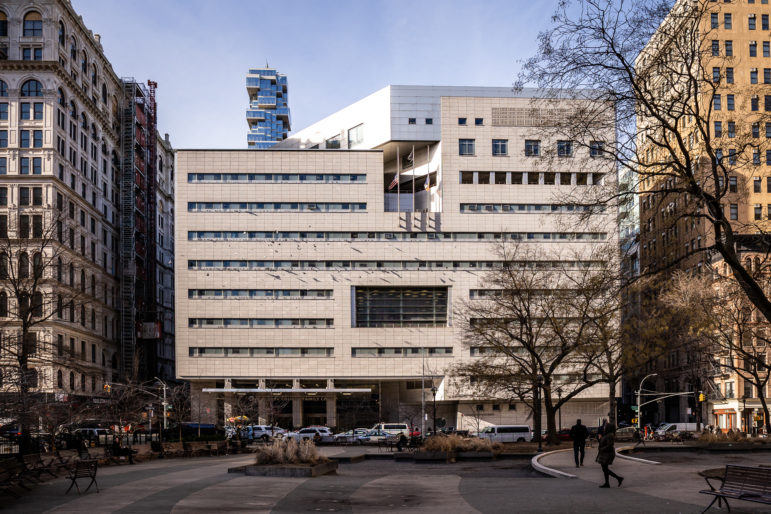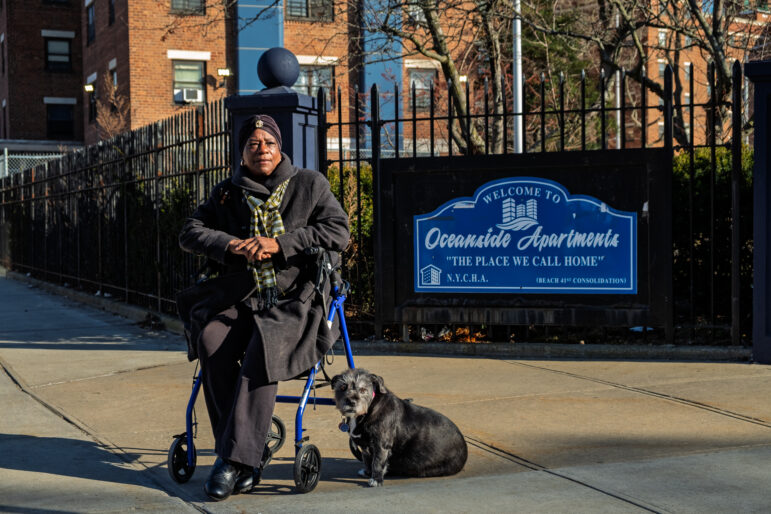
William Alatriste for the New York City Council
Ritchie Torres represented the district from 2014 until the end of 2020, when he took up his new office in Washington.This story is part of a City Limits’ series on the 2021 City Council races in partnership with Gotham Gazette, City & State and the Queens Daily Eagle. To read more, visit our Council Countdown page.
Voters in the Bronx’s 15th Council District won’t be able to say they didn’t have options this year.
Ten candidates ran in a March 23rd special election to fill the vacancy created when Ritchie Torres left for Congress. And on June 22, the district will be one of only two in the city to host both a Democratic primary—featuring eight names, seven of which are active candidates—and a Republican primary, featuring two. The primary winners will face off in November’s general election.
The question is whether the outcome in June or November will be any different than it was in March, when tenant lawyer Oswald Feliz prevailed in a race settled by ranked-choice voting. Feliz was sworn in to the Council recently and is, technically, the incumbent. His current term ends on Dec. 31, and the upcoming elections will decide who holds the seat from Jan. 1 through 2023.
Whichever Republican candidate—Aramis Ocasio or Ariel Rivera-Diaz—prevails in the primary will face steep odds in November. Democrats enjoy a 16:1 registration advantage in the district. In 2017, Democrat Torres won re-election with 94 percent of the vote. Rivera-Diaz ran in the nonpartisan March special election and placed 10th out of 10.
The Democratic primary is a tougher call. In the special election, it took 10 rounds of counting for Feliz to break the 50 percent mark under the city’s Ranked Choice Voting system—he only had 37 percent of the vote in the ninth round—and he ended up with just shy of 1,800 votes in a district housing 60,000 Democrats.
A high-poverty district
District 15 covers the belly of the borough, encompassing the neighborhoods of Bedford Park, Fordham, Mount Hope, Bathgate, Belmont, East Tremont, West Farms, Van Nest, Allerton and Olinville.
The heart of the district overlaps with Community Board 6, where 51 percent of renters pay 30 percent or more of their income toward rent, making them officially “rent burdened.” About 30 percent of residents live in poverty and the unemployment rate is 7.8 percent—both among the highest levels of economic need in the city. Fewer than one in seven residents has a college degree, well below Bronx and citywide averages.
In its annual statement of needs, the community board said the planned development of nearly 3,000 units of housing would increase the burden on local schools. The board also believes there is untapped potential in the district. “CB 6 has the East Tremont commercial corridor which has several small businesses, but also several vacant commercial spaces. This corridor has great potential, but the small businesses need assistance in getting organized to fulfill it,” the report reads. “Developing this corridor would help create more jobs that pay living wages.” So far, it notes, only one owner has taken advantage of a 2011 rezoning of East Tremont Avenue.
The board listed school overcrowding and unemployment as among the biggest challenges facing the district, but crime was its top concern. Crime is up about 10 percent in the 48th precinct this year, which covers the bulk of the district, with a dozen shootings so far in 2021 compared with last year. “While increased NYPD presence is important, so are the underlying causes of crime that must be addressed through efforts to reduce unemployment, supporting the previously incarcerated, and steering low-level offenders toward diversion and educational programs,” the district’s statement read.
Old and new names among the Democrats
Three of the people who ran in March’s special election—Elisa Crespo, Jose A. Padilla Jr. and Altagracia Soldevilla—are not on the June primary ballot. A fourth candidate, Latchmi Gopal, made the ballot but has ended her campaign. Meanwhile, two who did not engage in the March contest, Troy Blackwell and Lillithe Lozano, will be among the June 22 choices for Democrats.
Feliz prevailed in the special election despite spending slightly less than Crespo or John Sanchez, and even though independent spenders favored Ischia Bravo or Sanchez. It’s unclear whether independent spending will be a factor in the primary, or what role money will play overall. Candidates spent more than $829,000 on the special election but so far only $24,000 has been reported raised for the primary race.
Bernadette Ferrara is the founder of the Van Nest Neighborhood Alliance and a member of Bronx Community Board 11, which overlaps with the eastern side of the Council district. Her platform prioritizes “Oversight and accountability for absentee and negligent landlords who don’t maintain their properties, and destabilize neighborhoods by renting to tenants without screening them.” She also wants property-tax reform, to return all K-8 schools to geographic zones and a new library for Van Nest.
Feliz, a former aide to Sen. Gustavo Rivera, is a tenant lawyer. He says he will propose a bill “which will put an affirmative duty on police officers to intervene when they see another officer committing an improper act,” and also advocates requiring that all new buildings with 15 or more units set aside one-fifth of their apartments for low-income families. He wants high-performing public schools to reserve 25 percent of their seats for children from disadvantaged communities.
Blackwell had an internship in the Obama White House and worked for both the Tom Steyer 2020 campaign and the Biden-Harris ticket. He wants Area Median Income, the measure upon which rents in affordable housing are based, to be based on individual ZIP Codes rather than the regional measure that federal law now mandates. “Some of the issues I’m focused on include raising the value of the CityFHEPS voucher for those coming out of the shelter system, ending gun violence, and COVID relief,” he tells City Limits. “My identity being half Puerto-Rican/half African-American and LGBTQ helps me connect to a myriad of voters.”
Sanchez has been the district manager at Community Board 6 for nearly five years; before that he had stints at a pro-charter school organization, as an Assembly aide and as a personal trainer. He advocates increased workforce development funding and building housing on land now zoned for light manufacturing. Sanchez says he’d pursue free year-round home Internet access for students and would, “standardize phonics instruction so every student enters schools with the same core set of skills.”
Kenny G. Agosto is a Democratic district leader who serves as an aide to State Sen. Jamaal Bailey, the chairman of the Bronx Democratic party.
Bravo serves now as the district manager of Community Board 7. She calls for the city to move toward “racially equitable comprehensive planning,” more funding for violence interrupters and a stronger Civilian Complaint Review Board, broader use of composting and expanding the Summer Youth Employment Program.
Lozano is the head of the resident association at NYCHA’s Parkside Houses and an officer in the Citywide Council of Presidents of NYCHA resident organizations. She says there has been a general deterioration in the quality of life in the area: street vendors are being threatened by official enforcement, small businesses are struggling to survive and the conditions of the roads is a major obstacle when seniors want to simply cross the street. She reserves her harshest words for the Blueprint, NYCHA’s plan to put a preservation trust in charge of repairing the bulk of its units. “Having a trust and borrowing from a bank and not being assured of what’s going to happen to us,” she says. “There is no way that we can allow us to convert into Section 8.” She says the city should instead do a forensic audit of NYCHA to recover misspent money.
Republican rivals
Ocasio describes himself as a former licensed scaffolder/construction worker and a 2020 Trump-Pence campaign contributor. “Mr. Ocasio knows what his community needs and will go through any length to ensure a positive and safe environment we will all love and strive in,” his website reads. He tells City Limits he wants to create more outreach programs staffed by credible messengers, prevent evictions and “be on top of the police department.”
“I understand the diversity of the Bronx and I’m here to give the Republicans and other voters who are disenfranchised a reason to vote to bring reform that will make a sustainable and safe difference,” he writes.
The other Republican, Rivera-Diaz, is a finance clerk at the Board of Elections who previously worked in the healthcare industry. He was Republican mayoral nominee Nicole Malliotakis’s Bronx coordinator in 2017 and ran unsuccessfully for state Assembly in 2018. His campaign theme, as articulated on his website, is “Let’s reject the conformity of expecting the government to make change; and embrace the change of us being the catalyst to that change!”, although he is spare with details. On crime, his platform declares, “We must come up with a plan that will prevent crime.”
Elsewhere he says, “We need food sustainability and if necessary, we will take the fight to the federal government to solve this issue!” His most detailed ideas are on education. “My education plan involves inter-school extra-curricular programs, a revamp of public school funding usage and programs that will further amplify the students’ interest; through yearly in-school surveys,” he says. “It’s time that we start listening to the students and teachers of NYC.”
Round 2? Or Round 1.5?
On the question of whether anything will be different on June 22 from what occurred on March 23, Gopal, who placed fifth in the special, told her supporters the answer is yes.
“This will be an entirely separate race that requires a new batch of fundraising and resources,” she said in an April 23 Facebook post. “I want to be clear that this isn’t due to a lack of commitment to our communities or vision for a city budget that we deserve but rather the stark truth that it is difficult to navigate the political process as a young woman of color running a grassroots campaign that puts people first, always.”
Blackwell, one of the two people running now who didn’t contest the special, believes the differences create an opening for him. “Less than 5 percent of registered voters actually voted in March because many people weren’t aware of the election,” he writes. “There were many constituents that asked why would they vote in March and less than three months later, have to vote for the same position again. The timing of the elections confused people.”
Of course, that confusion could break either way—maybe people stayed on the sidelines in March, or maybe they voted then and will skip this one. The proximity of the elections, the novelty of ranked choice voting, the first June municipal primary since 1973 and the continuing impact of the pandemic make it hard to say. Says Lozano, expressing a sentiment probably every candidate and voter would endorse: “I’m finding it a really weird election.”









